If you're reading GoDaddy reviews to figure out whether this all-in-one platform is right for your website or online store, you're not alone. Known primarily as a top domain registrar, GoDaddy has expanded into a full-featured website builder and eCommerce platform, especially with its 2025 introduction of GoDaddy Airo, a suite of AI-powered tools for content, branding, and automation.
In this GoDaddy review, we’ll take a close look at its Website Builder and Online Store plans, including:
- Pricing
- Performance and uptime
- Ease of use
- Templates and design flexibility
- eCommerce features
- Marketing & SEO functions
- Customer support
Additionally, by the end of our GoDaddy reviews, if you decide that this platform is not a match, we'll also discuss some GoDaddy alternatives for your consideration. So stay tuned!
Our Quick Verdict on GoDaddy Reviews
GoDaddy is a well-established name in the web services space, and its website builder continues to cater primarily to beginners, small businesses, and solopreneurs looking for an all-in-one platform. With an emphasis on simplicity and speed, GoDaddy excels at helping users launch a professional-looking website quickly, without needing coding knowledge or advanced design skills.
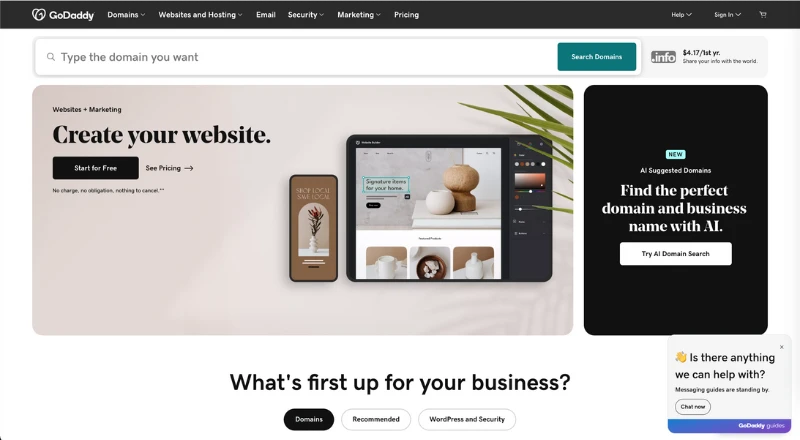
That said, its all-in-one nature comes with some trade-offs. While users will appreciate the integrated marketing tools, solid uptime, and quick setup, they may also find GoDaddy's customization options somewhat limited compared to more flexible platforms like WordPress or Shopify. Its eCommerce tools are solid for smaller stores, but may fall short for businesses scaling into larger or more complex operations.
From our experience, GoDaddy is a strong pick for users who prioritize ease of use, value built-in tools, and prefer a centralized platform for domain registration, hosting, and site building. However, those needing deep customization or enterprise-grade functionality may want to explore more specialized alternatives.
Overall, in our GoDaddy reviews, this platform earns a solid rating of 4.0/5 from our team of experts.
GoDaddy Pros and Cons
When looking at GoDaddy reviews, it becomes clear that this platform has both strong advantages and noticeable drawbacks. Below, let's break down GoDaddy pros and cons to help you decide.
Pros | Cons |
✓ No technical skills required with an intuitive drag-and-drop interface. ✓ Combines domain registration, hosting, and site builder under one roof. ✓ Includes email marketing, social media integration, and Google Ads setup. ✓ Offers reliable uptime with hosting services backed by solid performance metrics. ✓ Allows testing features before committing to a paid plan with a free trial. | ✗ Only comes with basic customization options, compared to Wix or WordPress. ✗ Offers fewer design templates than competitors; less room for unique branding. ✗ Lacks advanced eCommerce tools, not ideal for scaling. ✗ Doesn't offer a permanently free website tier. |
Who Is GoDaddy For?
As we've discussed above, GoDaddy is worth considering if you need a fast, no-fuss way to get a basic site or online store live. Yet, it’s not the best value long-term for growing brands or those who want deep customization.
So, from our experience, you should consider GoDaddy if you are:
- Total beginners or small business owners who want a fast, AI-assisted setup
- Solo founders looking to bundle domains, website, and email in one place
- Businesses that only need a simple, brochure-style website
Nonetheless, if you fall into these categories, GoDaddy might not be an ideal option:
- Anyone serious about eCommerce or SEO (Shopify, Wix, or WordPress are better)
- Creators or service businesses that need custom workflows, integrations, or scalable performance
- Users who prioritize strong support and transparent long-term pricing
GoDaddy Pricing
GoDaddy’s Website Builder and Online Store pricing is structured across three monthly plans: Basic, Premium, and Commerce. All of these tiers include AI-powered setup through GoDaddy Airo, domain connection, and marketing essentials. The key differences come down to how much functionality you need for bookings, selling, and marketing reach.
Here’s a breakdown of the current monthly pricing (as of GoDaddy reviews 2025):
- Basic – $21.99/month: Best for simple personal sites or service pages
Includes: custom domain connection, ad removal, SEO basics, content tools - Premium – $39.99/month: For creators and service providers who need online booking
Adds: appointment booking, 25,000 email sends/month, social ad tools - Commerce – $44.99/month: For serious sellers and online stores
Adds: unlimited products, marketplace selling (1,000 orders/mo), 100K email sends, shoppable posts, sales tax automation
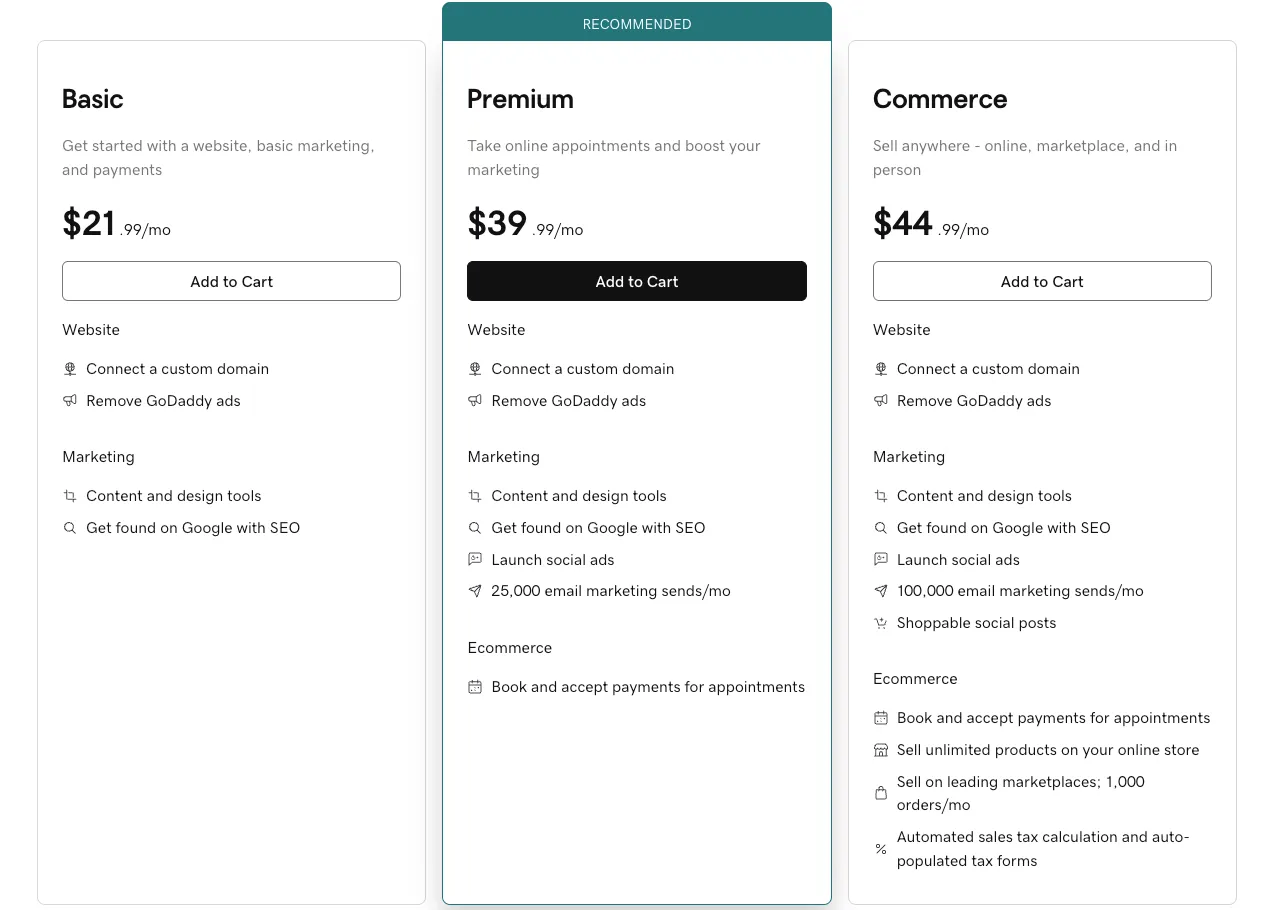
If you're just exploring, GoDaddy also offers a limited-time Airo™ All Access trial, giving you access to its builder, domain, and marketing tools for $1/week over 12 weeks (billed at $12). It’s a solid way to try the platform before committing to a full-priced plan.
Writer’s note: These prices reflect standard monthly rates. While GoDaddy often promotes discounted intro pricing (like $1/week), all plans auto-renew at full price unless canceled. Based on GoDaddy reviews, many users report surprise charges or upsells down the line, so be sure to double-check the renewal terms.
Performance and Uptime
Website performance can make or break your online presence — whether it’s user experience, SEO, or conversion rates. While GoDaddy offers convenience and fast setup, how well does it hold up when it comes to actual site speed and uptime?
GoDaddy officially promises a 99.9% uptime guarantee, which translates to about 8.77 hours of downtime per year. In independent tests for GoDaddy reviews (e.g., WebsiteSetup, HostingFacts), GoDaddy's average uptime over 12 months hovers between 99.95% and 99.98%, which is reliable enough for most small to mid-sized sites. Outages are rare, but like many budget hosts, there have been occasional reported incidents, especially with WordPress hosting.
GoDaddy doesn’t publish official benchmarks for Website Builder performance, but in practice:
- GoDaddy Website Builder (including Airo-powered sites) performs reasonably well, especially when using default templates with optimized content. Pages typically load fast enough for casual users and small business traffic.
- Hosting Performance (for WordPress or cPanel users) depends heavily on plan type and configuration. While you can enable performance boosts like caching and a CDN, shared hosting users may still experience slowdowns during peak traffic times.
GoDaddy’s own documentation recommends best practices like using compressed images, enabling GZIP compression, and connecting to a third-party CDN — but most of these are manual setups, especially outside the Website Builder ecosystem.
GoDaddy is stable enough for most basic websites, but it isn’t optimized for heavy traffic or performance-obsessed projects. If site speed and uptime are make-or-break for you, consider a more specialized host.
Ease of Use
The setup experience is genuinely beginner-friendly. You answer a few questions, and GoDaddy’s AI assembles a ready-to-edit site, complete with layout, dummy text, and even a sample logo. It’s efficient and feels low-pressure, which is a big plus for non-technical users or business owners trying to launch quickly.
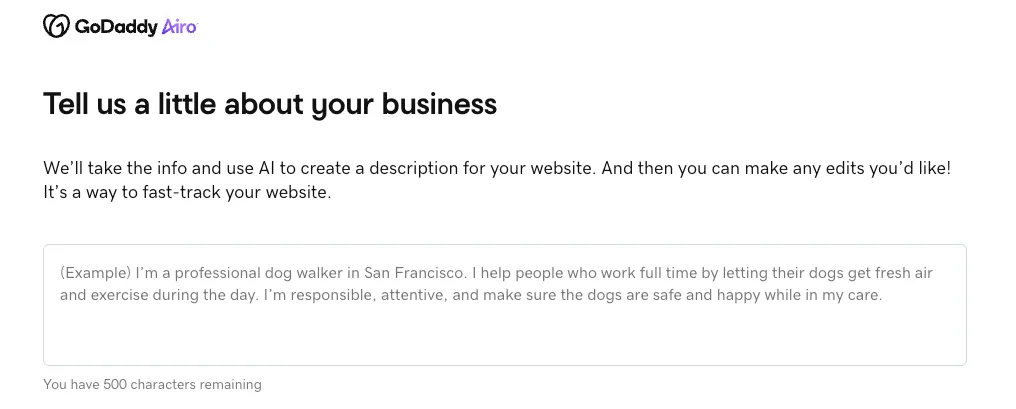
However, this simplicity comes at the cost of flexibility. Once the AI-generated layout is in place, you work in a structured environment. Drag-and-drop customization is possible but limited, and more design-savvy users often find the editor too rigid.
To help you get started quickly, GoDaddy introduces the Airo function. This tool handles naming, logo suggestions, on-site content, and some automation, and for first-timers, it can speed things up. It also ties into GoDaddy Studio for simple social media graphics.
For $12 total, users get 12 weeks to try out all of GoDaddy’s business tools, including:
- A custom domain (free for 1 year)
- Website + online store builder (powered by AI)
- Logo generator (Airo™ Plus Logo)
- Branded email (Microsoft 365 trial)
- Digital marketing tools (social posts, payments, content studio)
- Phone line + unified inbox (Conversations Deluxe)
Note: After 12 weeks, you must manually upgrade to a paid plan to continue. Your domain will auto-renew after one year unless canceled. This trial is ideal for users who want to test the full GoDaddy ecosystem without committing upfront.
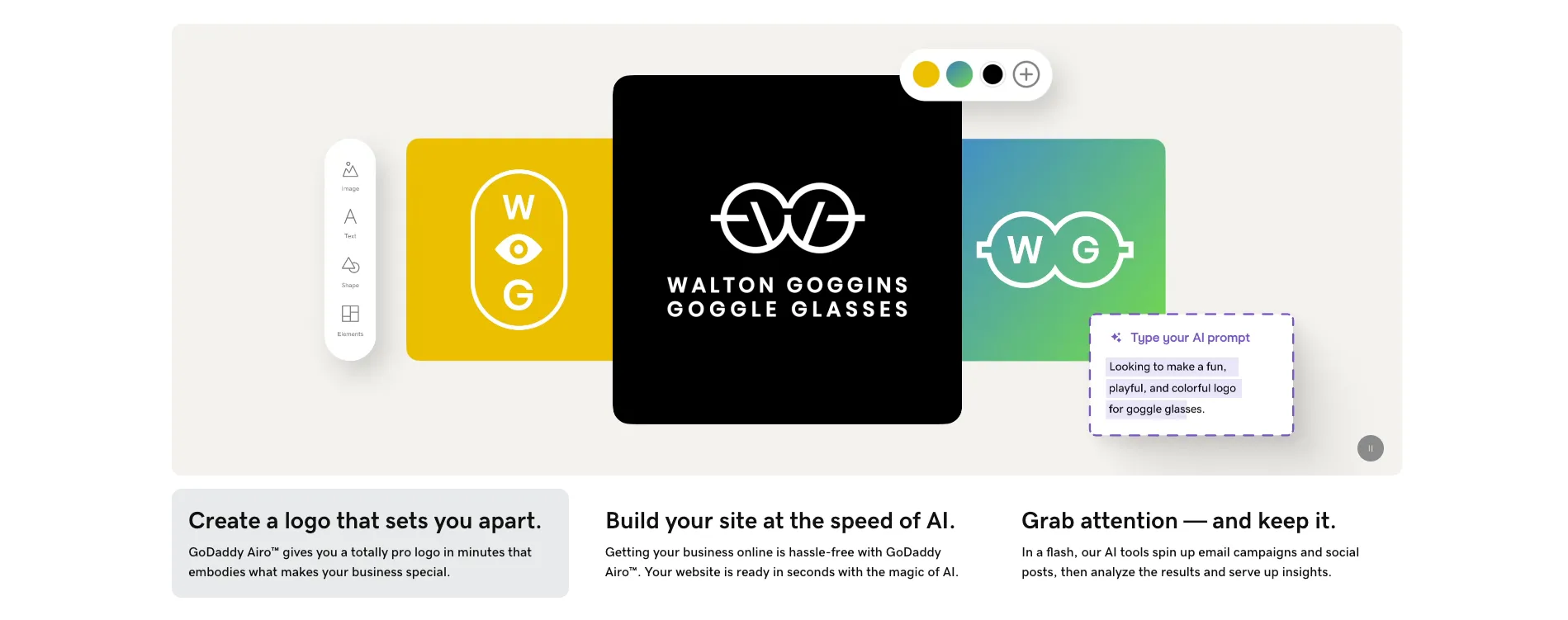
But while useful at launch, the AI tools aren't as deep or brand-aware as some users expect. You won’t get long-form content, advanced automation, or real-time performance feedback — just decent starting points.
Templates and design flexibility
When exploring GoDaddy reviews, many users mention the importance of good templates and flexible design tools. GoDaddy offers a selection of website templates that are clean, modern, and mobile-friendly. These templates help users create a professional-looking website quickly, even if they have no design experience.
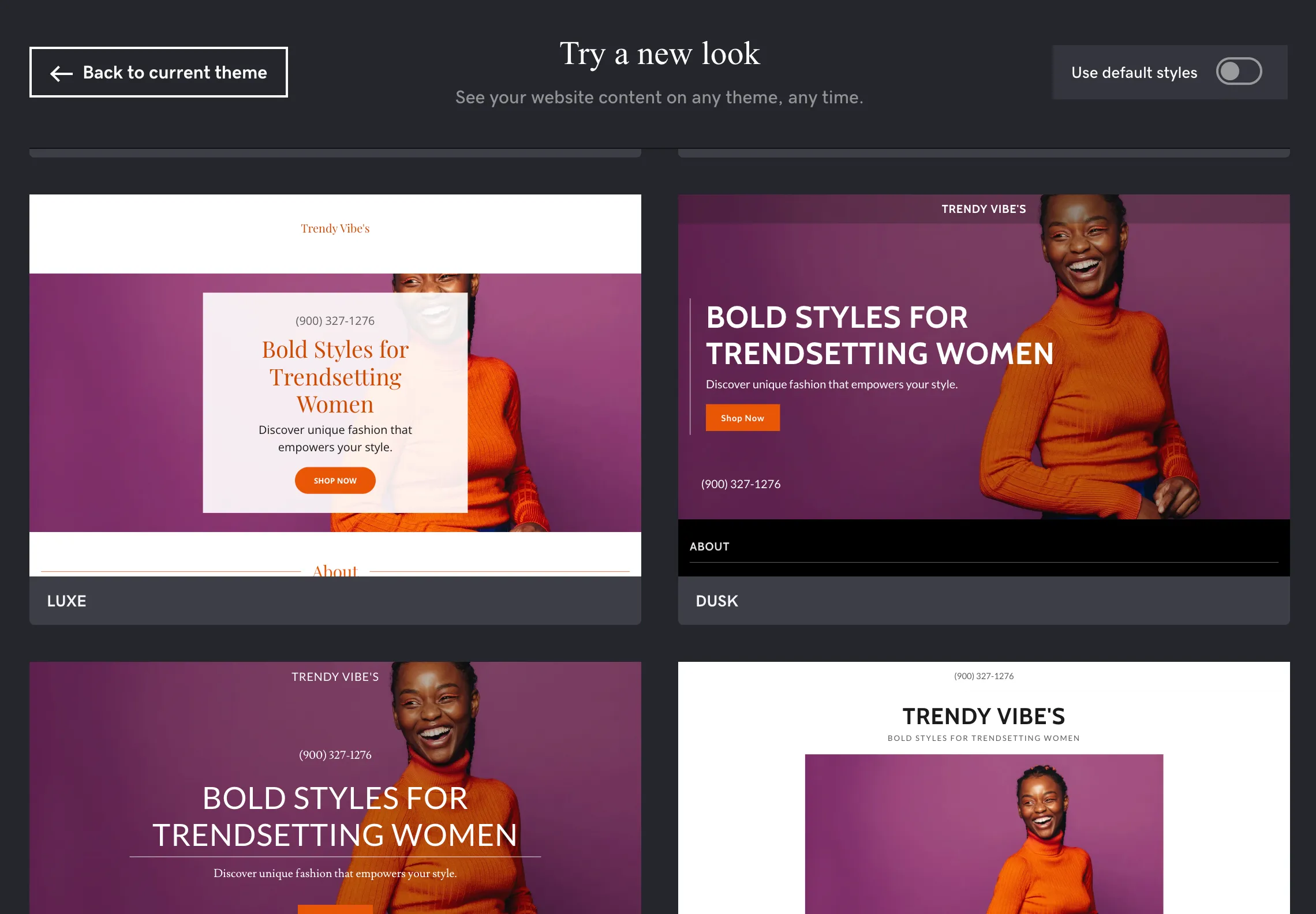
At the start, users can choose from a variety of template categories, such as business, online store, personal blog, or portfolio. Each template comes with preset layouts, fonts, and color schemes that fit the category. Besides, the drag-and-drop editor is also smooth and easy to use. It allows users to rearrange elements and preview their site in real time.
However, when it comes to customization, GoDaddy has some limits. Users can change basic elements like text, images, colors, and sections. But they cannot fully control layout structure or advanced styling, such as custom fonts or animations. The builder does not allow access to CSS or HTML, which can be a downside for users who want more creative control.
eCommerce Features
Product management
The Commerce plan supports physical and digital products, services, and simple scheduling. The backend makes it easy to create items, add variants, manage inventory, and apply pricing or discounts.
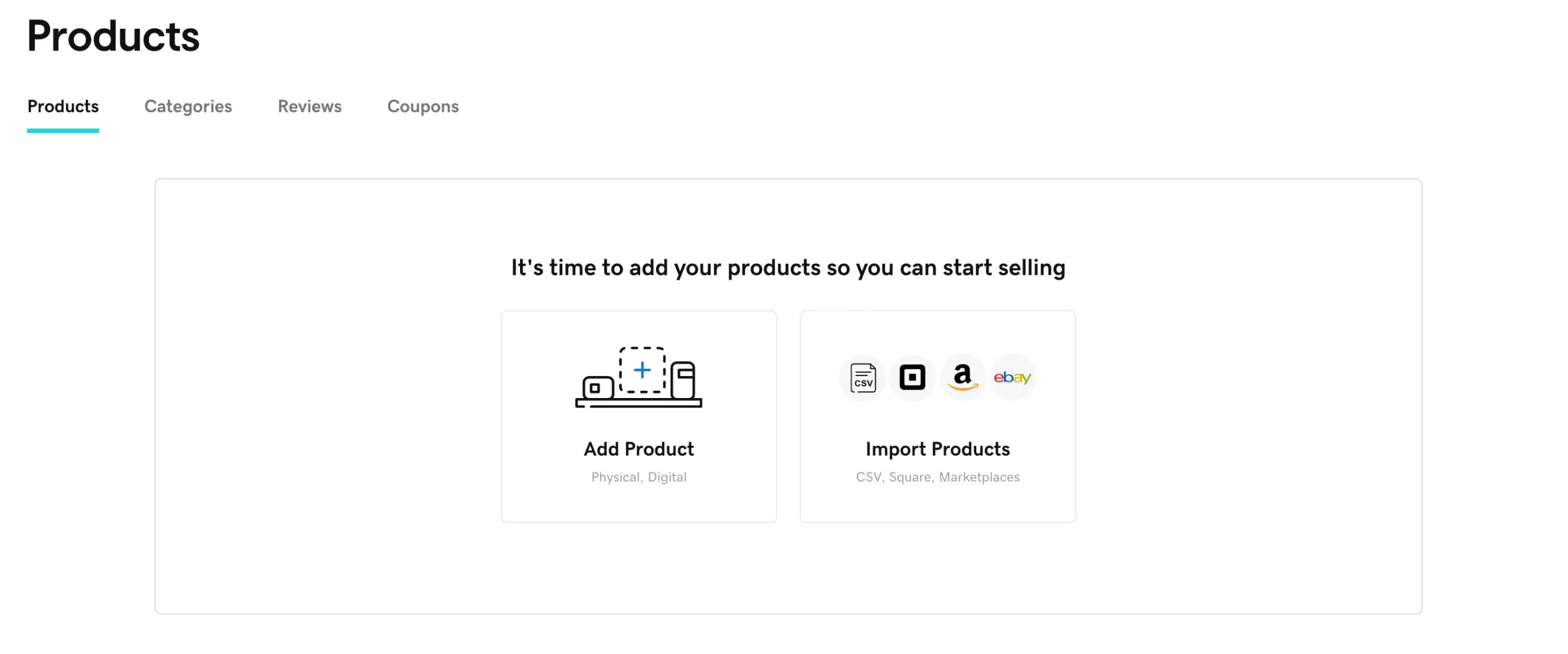
It handles light catalogs well and suits small product lines or service offerings. However, compared to Shopify or WooCommerce, GoDaddy lacks advanced tools like custom product templates, bundling logic, or app integrations.
Payment and checkout experience
The platform supports most mainstream payment options:
- Credit/debit cards via GoDaddy Payments, PayPal, Stripe
- Buy Now Pay Later via Klarna and Afterpay
- Apple Pay on mobile
The checkout process is mobile-friendly and frictionless for standard purchases. That said, customization is minimal. You can’t style the checkout experience or add advanced upsell flows, and some GoDaddy users I know mentioned frustrations around taxes and shipping logic not syncing well across tools.
Shipping and delivery
GoDaddy allows users to set up different shipping methods. Store owners can offer flat-rate shipping, where customers pay a fixed amount for every order. They can also use weight-based shipping, where the shipping cost changes depending on the total weight of the products. This gives businesses flexibility to match their shipping fees to their products.
In addition, GoDaddy supports free shipping. Many businesses use this option to attract more buyers and encourage larger orders. For businesses with physical locations, GoDaddy also offers local delivery and in-store pickup. These options help serve local customers who prefer fast or no-cost delivery methods.
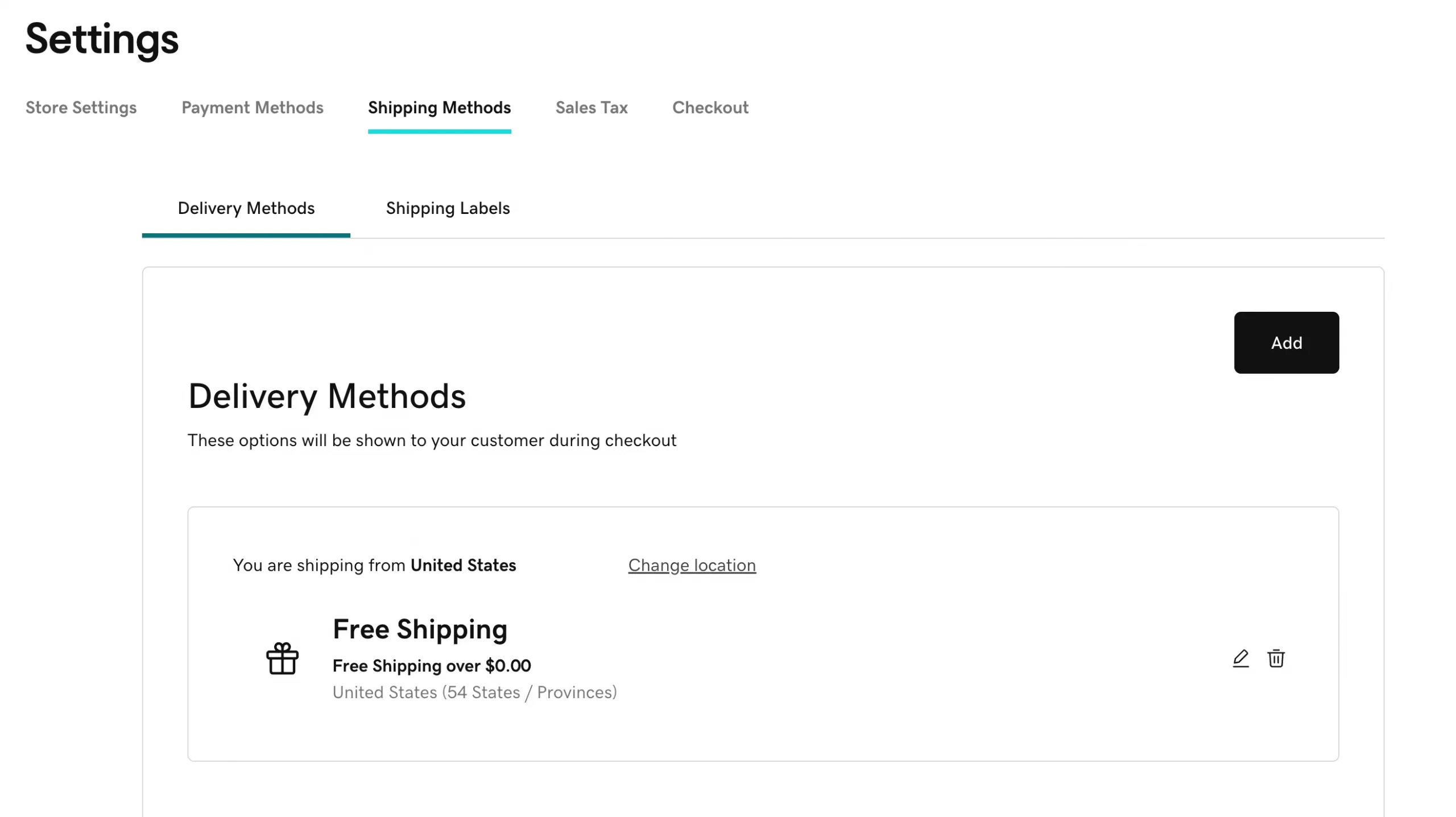
Overall, our GoDaddy reviews indicate that its shipping and delivery features work well for small businesses. The platform may not have advanced shipping integrations like some larger eCommerce platforms, but it covers the basic needs of most online sellers.
Marketing & SEO Functions
Marketing features
Email marketing is built in, with send caps based on your plan tier. There’s also a light CRM, a branded inbox, and scheduling tools for social posts. It’s all usable, but not a replacement for platforms like Mailchimp or Klaviyo.
Some users report inconsistent email deliverability and basic audience targeting. Abandoned cart emails are available but are limited in logic and customization.
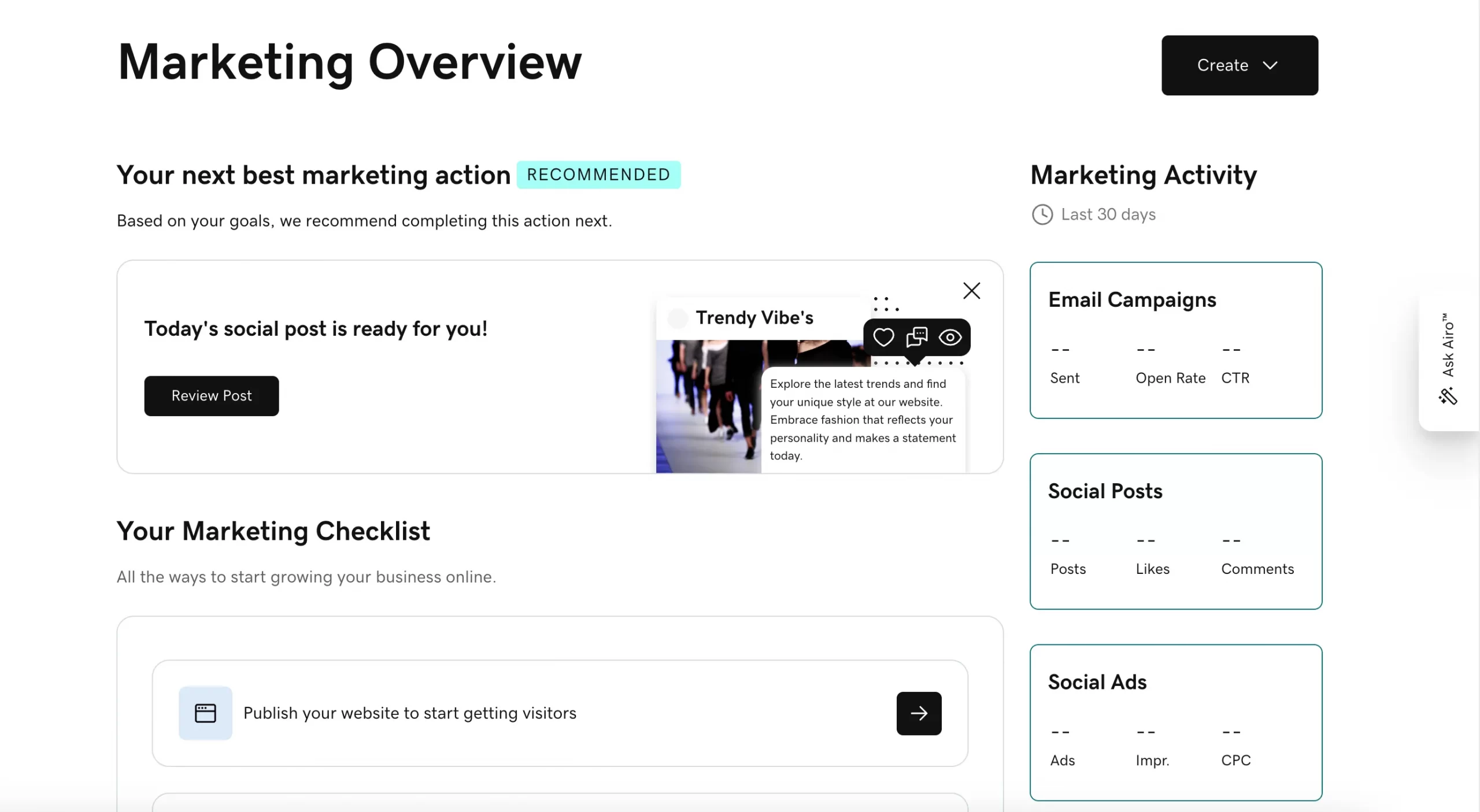
The bottom line is that GoDaddy’s builder works well to make a site live quickly with minimal friction. It covers the basics — templates, eCommerce, marketing — in a way that’s accessible to first-time users. But if the goal is long-term growth, branding flexibility, or advanced selling features, it starts to feel restrictive.
Personally, I think it’s fine for something like a digital business card or starter site, but I wouldn’t recommend it for anyone trying to build a brand with long-term plans to scale.
GoDaddy SEO
Security and SEO are often afterthoughts when picking a website builder, but they make a real difference, especially if you're running a business. So how well does GoDaddy handle them?
GoDaddy includes the usual core SEO features:
- Custom meta titles and descriptions
- Page-specific keywords
- Automatic sitemap generation
- SEO Wizard (step-by-step checklist for beginners)
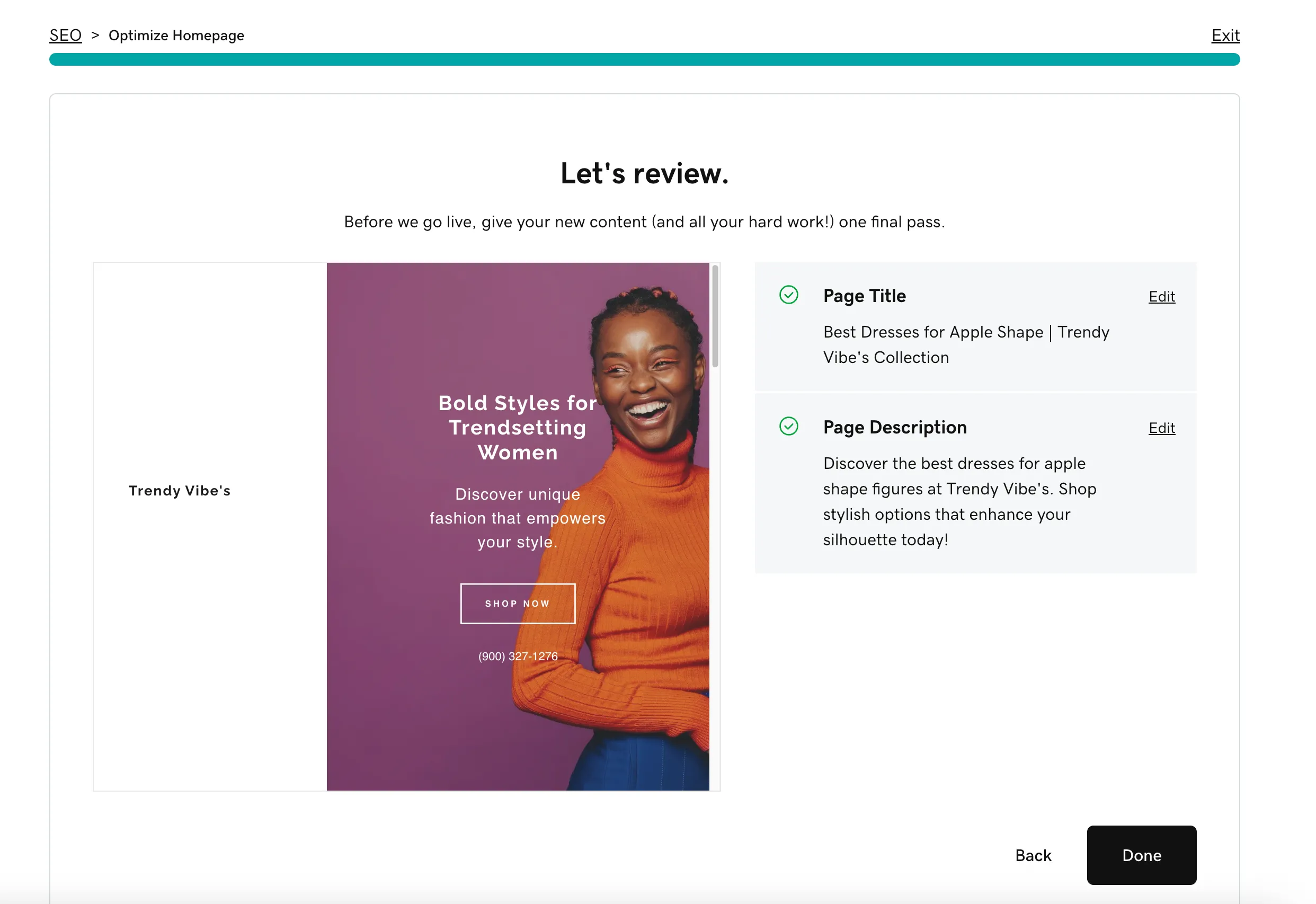
For a first-time site owner, that’s enough to cover the basics. You can set up structured metadata, adjust page visibility, and add alt text, but there’s no schema editor, no SEO app integrations, and limited support for content-driven optimization.
From what I’ve gathered, many users trying to improve their rankings with GoDaddy hit a ceiling. On Reddit and in builder forums, it’s common to see comments that say SEO efforts didn’t move the needle, especially compared to platforms like WordPress (with tools like Rank Math or Yoast) or even Wix, which has more granular SEO control.

Beyond that, GoDaddy also offers paid SEO Services — handled by their in-house marketing team — for those who want hands-off support. These services cover keyword research, technical optimization, and monthly reporting. But based on reviews and community feedback, they’re really built for small, local businesses with modest goals — not for serious organic growth or content-driven brands.
For security, GoDaddy includes SSL encryption by default on all plans. You’ll also get:
- Automatic backups (daily or weekly, depending on plan)
- Malware scanning
- DDoS protection on GoDaddy-hosted domains
- Optional privacy protection for domains
Everything is handled behind the scenes, which is great if you don’t want to consider security. But if you’re someone who wants to adjust security headers, manage your own firewall, or install third-party monitoring tools, this won’t be the platform for it.
It’s worth noting that GoDaddy has had some backlash around domain practices, with users reporting pushy upsells for privacy, renewal charges, and slow support during DNS issues.
Customer Support
GoDaddy offers 24/7 support through live chat and phone, along with a help center, AI chatbot, and user community. On paper, that’s solid coverage for anyone managing a domain, website, or online store.
In practice, however, the experience can be mixed. While basic questions around domains, billing, and general site setup are typically handled quickly, more technical issues — like DNS troubleshooting, Airo-specific tools, or email forwarding — sometimes lead to generic responses or require escalation. While fast, the AI chatbot doesn’t always resolve more nuanced problems, which some users have found frustrating.
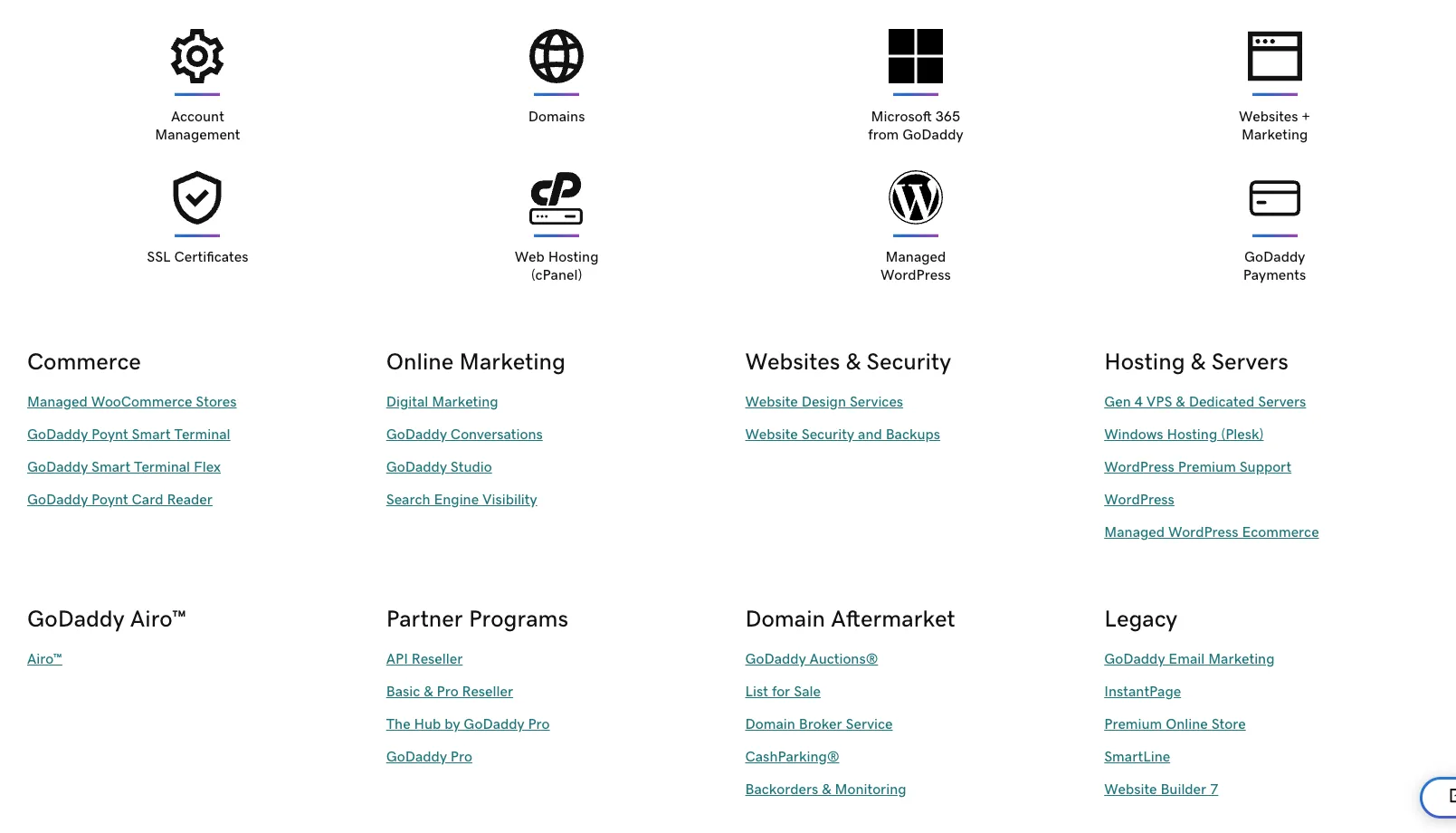
A common point among GoDaddy reviews raised in community forums and Reddit threads is GoDaddy’s approach to upselling. Services like email hosting, SSL certificates, site backups, and privacy protection are not always included by default and can drive up the overall cost. Some users have also noted that the renewal process or account management can feel unclear, especially when downgrading or transferring services.
So why does GoDaddy still maintain a strong rating on platforms like Trustpilot (4.6/5 at the time of writing)? Many of the recent reviews highlight smooth onboarding, quick domain setup, and helpful phone support, especially for small business users looking for convenience over complexity.
I have had my domain, website builder and email services for my business through GoDaddy for over nine years. The customer service has been absolutely incredible any time I have ever needed to call in. I would choose GoDaddy again and again and again because of their consistent, phenomenal customer service.
Beth Manteuffel – TrustPilot review in April 2025
That said, more technical users or those managing larger websites may find the support experience limited when compared to hosts that specialize in performance or deeper customization.
In short, GoDaddy’s support is accessible and friendly for everyday needs, but it may not go far enough for complex technical setups or users who prefer deeper platform control.
GoDaddy Alternatives for Your Consideration
At the end of the day, if GoDaddy isn’t the right fit — or if you’ve hit its limits — the good news is, you’ve got options. When conducting this GoDaddy reviews, we’ve looked into (and seen others compare) platforms that offer better performance, design freedom, or support depending on what matters most to you.
For full design control: Wix
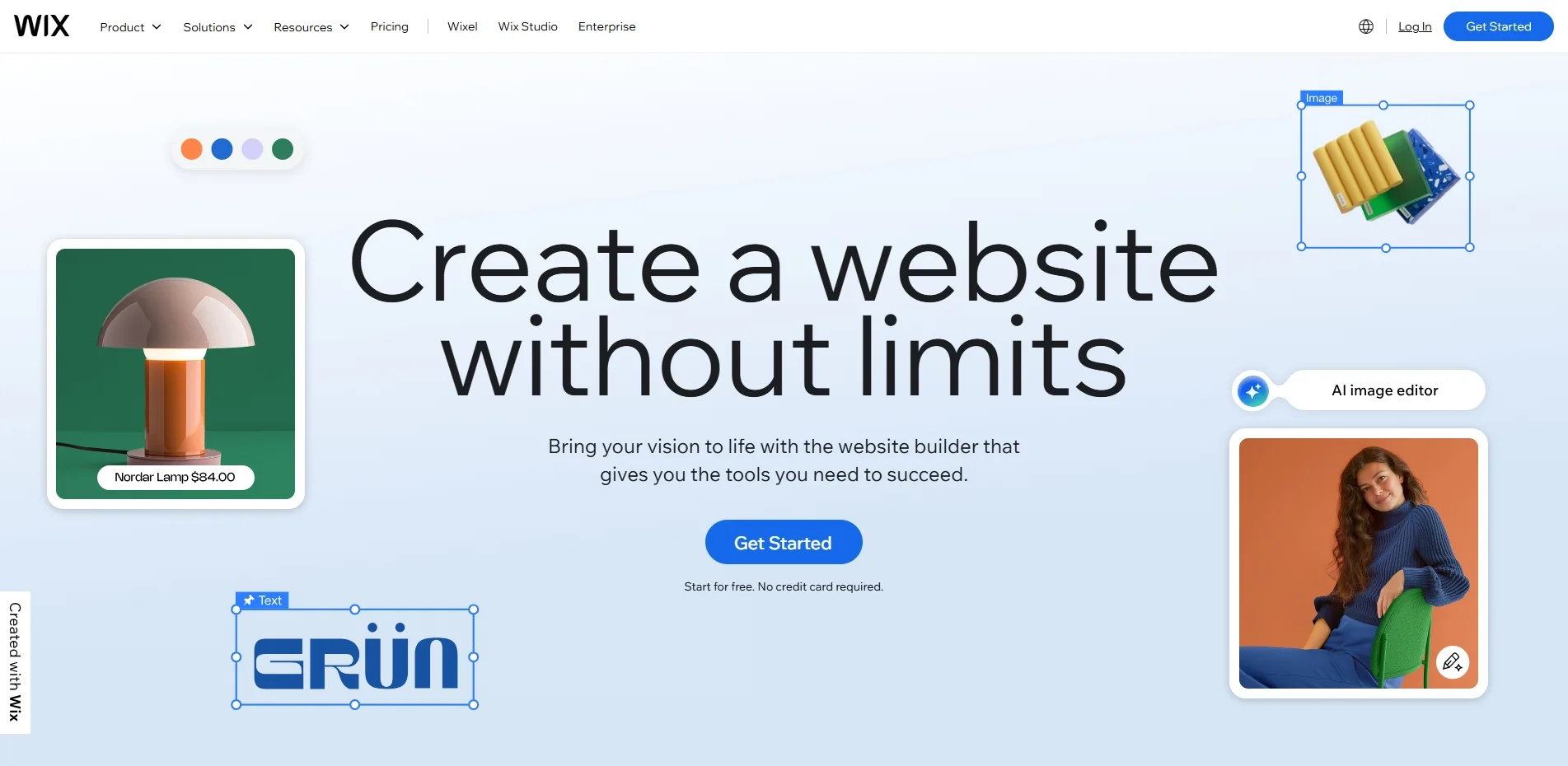
Wix stands out for one key reason — freedom to design. The drag-and-drop editor is far more flexible than GoDaddy’s, with over 800 templates to start from. You can tweak every element on the page, add scroll effects and animations, and even use their Editor X version for more advanced designs.
- More creative control and AI-site generation
- Better SEO tools
- The app ecosystem is richer
- Pricing is comparable, but no aggressive upsells
If visual design is a core part of your brand, Wix is the clear step up.
For a clean, stylish look: Squarespace
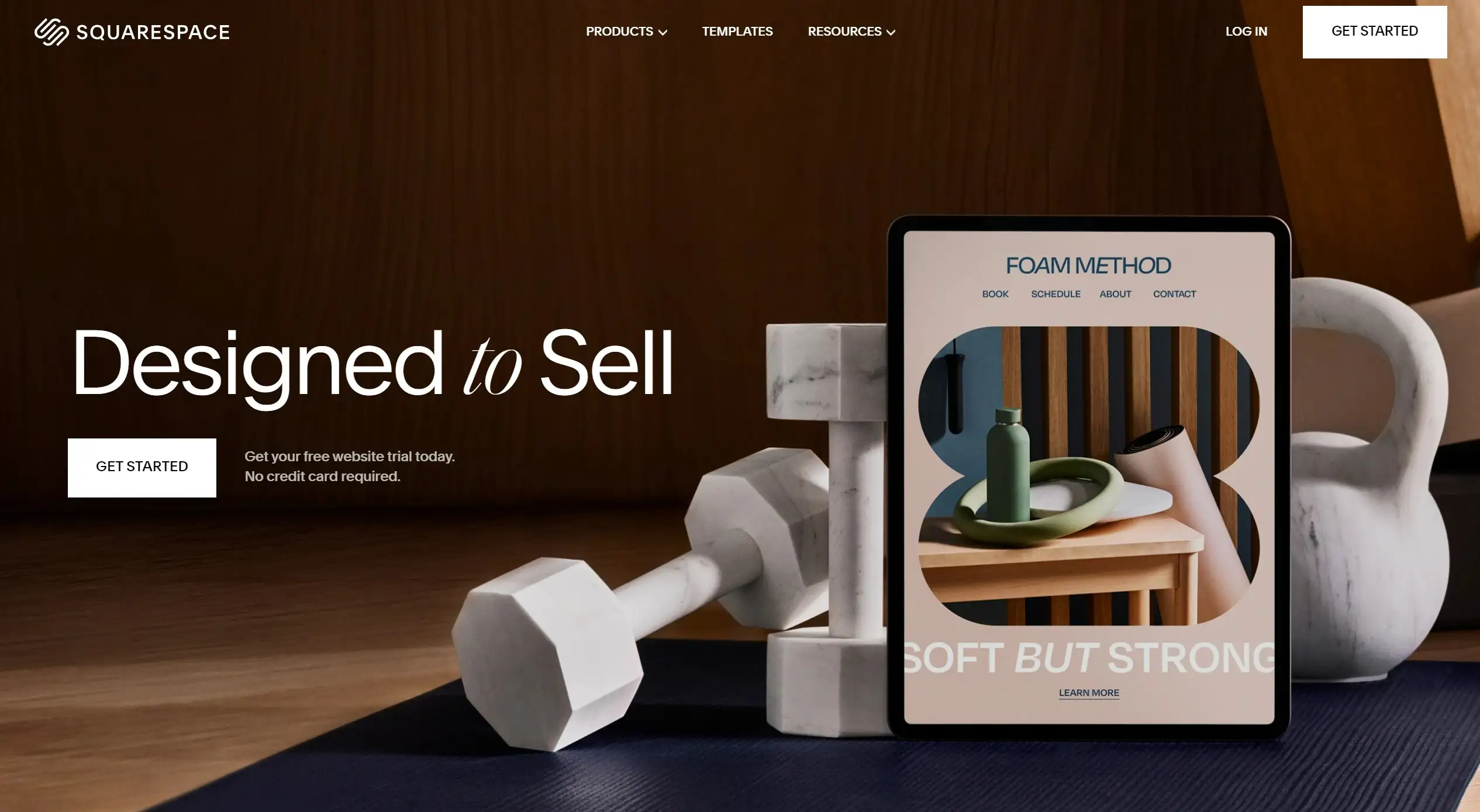
Squarespace doesn’t give you as much freedom as Wix, but what you lose in control, you gain in polish and structure. Their templates are visually sharp, especially for portfolios, service brands, and content creators.
- Strong built-in design patterns
- Better blogging experience than GoDaddy
- Built-in email marketing and scheduling tools
- Slightly higher starting price, but more consistent
I would say that if you're willing to spend $5 more, the experience is cleaner and more refined than GoDaddy.
For serious eCommerce: Shopify

If your main goal is to sell, not just build a brochure site, Shopify is the go-to. It has better inventory management, faster checkout, better app integrations, and a real ecosystem around growth and marketing.
- Built specifically for eCommerce
- Abandoned cart, taxes, shipping, and reporting are all stronger
- More scalable as your store grows
- Pricing starts higher, but you’re paying for selling power
If you’re even semi-serious about building an online store, Shopify outperforms GoDaddy in just about every area that matters.
For technical SEO and blogging: WordPress
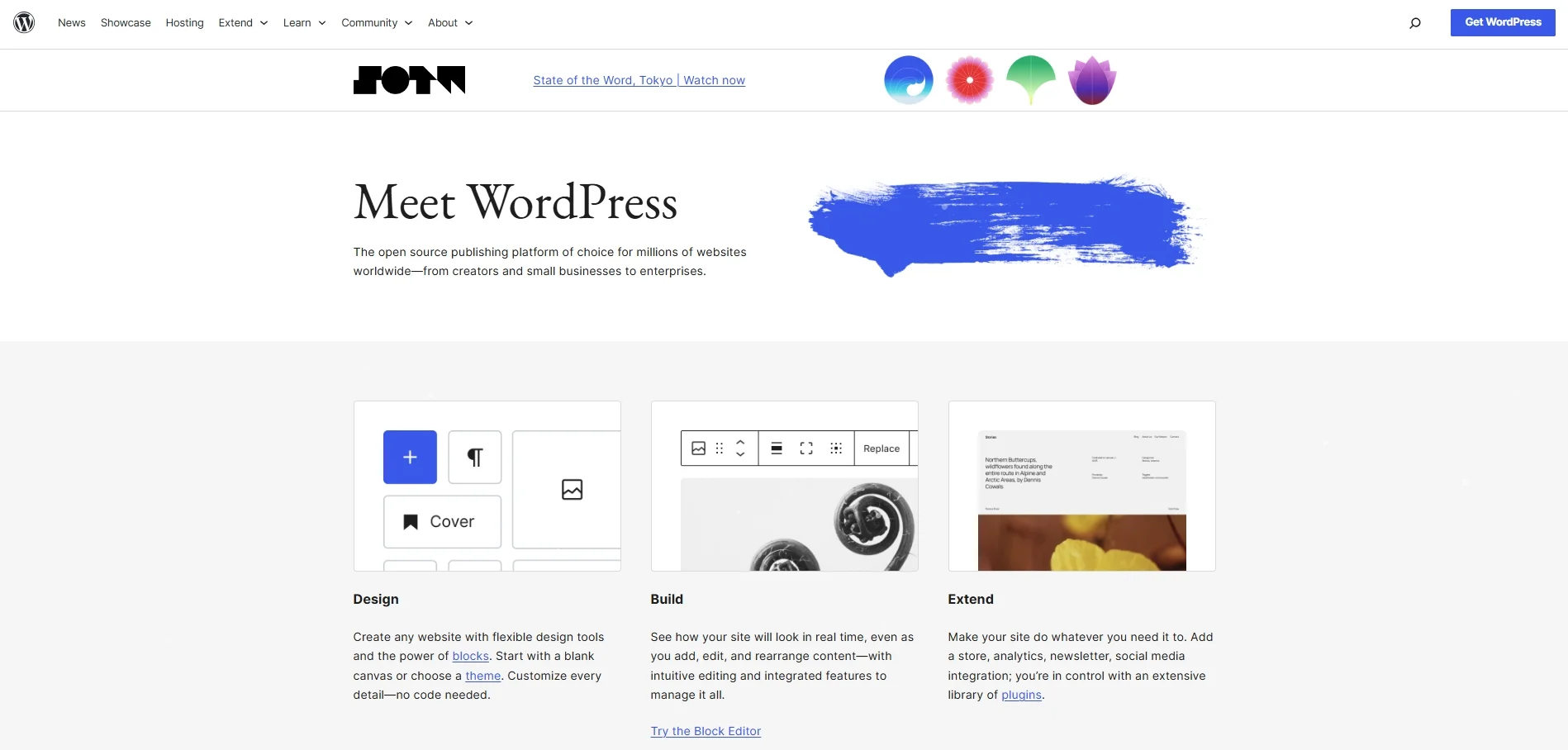
Finally, if you want control, SEO depth, or content-first workflows, WordPress (with a good host) is worth the learning curve. Yes, it’s more setup, but the flexibility is unmatched. You can use builders like Elementor or Kadence to get the best of both worlds.
- RankMath, Yoast, and advanced SEO control
- Better for long-form content, niche blogs, service SEO
- Total ownership of design and functionality
- Paired with good hosting (like SiteGround or WP Engine), performance is strong
Bottom line: GoDaddy isn’t bad — it’s just limited. If you’re after speed and simplicity, it’ll do the job. But if you want to go beyond the basics, these platforms give you more room to grow, with fewer trade-offs.
Our Methodology – How We Test GoDaddy
We use a hands-on approach to create every GoDaddy review. First, we open a real GoDaddy account and choose a plan that most users would select. Then, we build a complete website to experience the platform exactly as new customers do.
To measure performance, we test page speed, uptime, and overall reliability using trusted tools like GTmetrix, Pingdom, and Google PageSpeed Insights. This helps us understand how well GoDaddy websites perform under real conditions.
Next, we evaluate design flexibility by testing the available templates and customization options. We check how easily users can change layouts, colors, fonts, and other design elements without needing technical skills.
We also build a test online store to review GoDaddy’s eCommerce features. We test product listings, payment processing, checkout experience, inventory management, discounts, and shipping settings to see how well the platform supports online selling.
In addition, we explore GoDaddy’s built-in marketing and SEO tools. We test email marketing, social media integration, SEO features, and keyword tools to determine how effectively users can promote their websites.
Finally, we contact GoDaddy’s customer support through chat, email, and phone to evaluate their response time, helpfulness, and problem-solving ability. This gives us a complete view of the customer service experience.
GoDaddy Reviews: FAQs
How trustworthy is GoDaddy?
As a brand, GoDaddy has been around for decades and manages millions of domains — so yes, it’s established. But in terms of trust, it depends on what you value. The platform does what it promises, but many users have raised concerns about aggressive upsells, unclear renewals, and customer support that doesn’t always go deep.
Is GoDaddy’s website builder worth it?
It depends. For a quick, simple site — yes. For long-term brand building, not so much. The builder is easy to use, but limited in design and functionality. You’ll likely outgrow it once your needs get more specific.
Is GoDaddy a good place to buy a domain?
You can buy domains easily through GoDaddy, and the interface is clean. However, privacy protection and renewals often come at a higher cost than those of competitors like Namecheap or Porkbun. Some users also report issues transferring domains out, so read the fine print.
How good is GoDaddy for hosting?
GoDaddy’s shared hosting works fine for basic sites, but performance can dip, especially if your site ends up on an overcrowded server. The company rarely reassigns you to better infrastructure unless you upgrade. If hosting speed and stability matter, there are better options out there.
Is GoDaddy good for small business websites?
For small, service-based businesses that just need a clean site and a contact form, GoDaddy works. But if you need booking tools, local SEO, or want to run marketing campaigns, other platforms offer more flexibility and scalability.
Can I sell products with GoDaddy?
Yes — the Commerce plan lets you sell physical products, digital downloads, and even services. You can manage orders, payments, and taxes, but the system is basic compared to Shopify or WooCommerce.
Final Words: Is GoDaddy Right for You?
GoDaddy has come a long way from just being a domain registrar. In 2025, it offers a full suite of tools, from website building and online stores to AI-powered content and email marketing. And for some people, that’s enough.
If you’re just starting and need to get a basic site live quickly, it does the job. It’s especially decent for service-based businesses, side projects, or anyone who just wants a clean, no-fuss online presence.
But once you start needing more, better design control, deeper eCommerce features, long-term SEO flexibility, or reliable support, GoDaddy starts to feel more like a stepping stone than a platform you grow with.
Personally, I think it fits best as a beginner’s tool or a fast-launch option. Just go in knowing the limitations, and keep an eye on renewals and upsells.
We hope you found this review of GoDaddy insightful. For more content like this, be sure to visit the LitExtension blog and join our eCommerce community to gain further insights and connect with fellow business owners.

